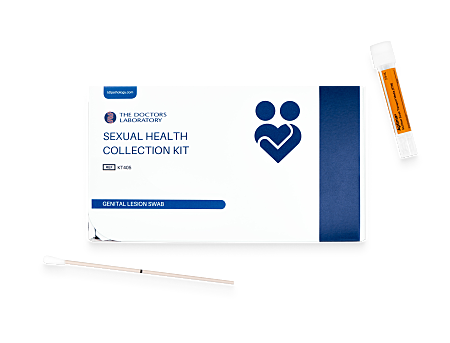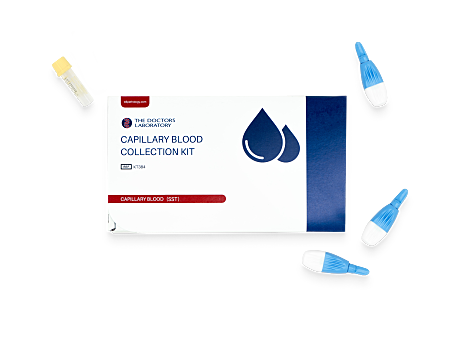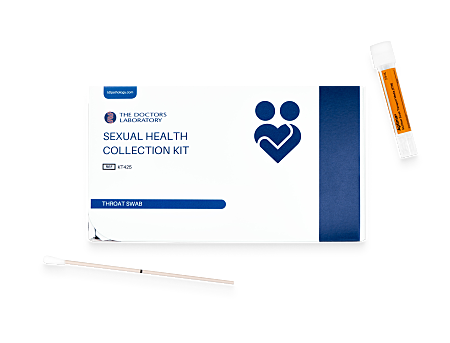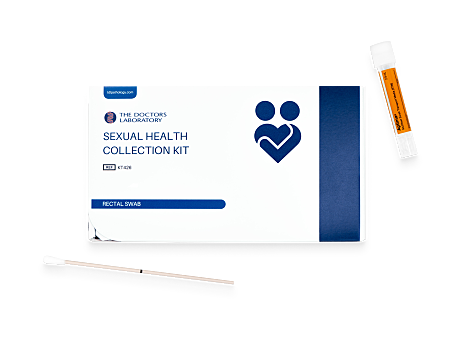
Sexually Transmitted Infection (STI) Test Kits
Test discreetly for STIs from the comfort of your home. Results, advice & treatment in just 72 hours
-

No face to face appointments or trips to a clinic. Test for the most common STIs from your home.
-

Get tested quickly with rapid next-day delivery in discreet, unmarked packaging and FREE return postage
-

Results, advice & treatment (if needed) from our expert doctors in 72 hours. All online and hassle free.
If you've had unprotected sex or you're worried you've caught an STI, you need to get tested quickly to know for sure and avoid spreading it. With our service, you can get answers confidentially without leaving your home.
We provide tests for over 14 different STIs and get results to you within 72 hours.
All you have to do is:
- Choose the test kit you want – If you're unsure, you can message our doctors directly for advice or complete our free advice form
- Place your order online
- Take your test at home
- FREE postage to send your sample to our lab
- Get results & advice in 72 hours
We will provide a full report explaining your results and what to do next.

Medically reviewed by
Dr. IkejiLast reviewed: 24 Jul 2024
Available Test Kits


Please check your spelling or try another treatment name.
Delivery Options
How it Works



About STI Testing
When to get tested for an STI
You should get an STI test as soon as you think you may have been infected. It’s advisable to get tested if you:
- have recently changed sexual partners
- are sexually active having unprotected sex, or have had multiple partners
- have symptoms of an STI
- have had sex with someone who has an STI
- are a student going to university or are returning from university
- have been informed that a previous or current sexual partner has an STI
How soon after unprotected sex should I test for an STI?
How long you will need to wait to get an STI test after unprotected sex will depend on the STI you think you might have. This is because it can take different lengths of time for the infection to show up on a test.
| Type of STI | How long to wait |
|---|---|
| Chlamydia | 2 weeks |
| Gonorrhoea | 2 weeks |
| HIV | 6-7 weeks |
| Hepatitis B | 12 weeks |
| Hepatitis C | 12 weeks | Syphilis | 3-6 weeks |
How to use a home test kit
How you use a home test kit will depend on the type of sample you need to provide.
Urine tests
In men and women, a first-catch urine (FCU) sample can be collected for a chlamydia and gonorrhoea test.
For an FCU you’ll need to:
- collect urine that has been held in the bladder for at least an hour, preferably first thing in the morning
- ensure you collect the first 20 ml of urine
A urine test is the most accurate STI test for men. It involves peeing into a small pot, similar to the one given by your GP.
Genital swab tests
In women: A vulvovaginal swab is used to collect a sample. This can be done by yourself at home and involves inserting the swab around 5 cm into the vagina and rotating gently for 10 to 30 seconds.
In men: A urethral swab is inserted into the urethra, around 2 to 4 cm and rotated once to collect a sample.
Oral swab
Men and women can use a test kit to swab for oral chlamydia and gonorrhoea. The test requires a sample to be taken from the back of the throat.
Anal swab
Men and women can use an anal test kit to check for chlamydia and gonorrhoea. You’ll need to collect a sample by inserting the swab into your rectum.
Blood test
A blood test is used to check for STIs, such as HIV and syphilis in men and women. An at-home finger prick blood test is used to collect a few drops of blood that can be sent to our partner lab to check for antibodies that would suggest an infection.
Getting your test results
Once you have returned your sample to our laboratory, you should receive your results around 2 to 3 days after they have received it, depending on the test.
When your results are available, one of our doctors will message you through our secure messaging service. You can view your results securely by logging into your Superdrug Online Doctor account. Our doctors will never send your results via text or email.
How long will it take to get your results?
You should receive your results 2 to 3 days after our lab has received your sample.
Some test results can take longer:
- HIV test: 3 to 5 days
- Extended STI test: 4 to 5 days
What to do if you test positive?
If you test positive for an STI, our doctors will be able to advise you on what to do next, including treatment advice.
For most STIs, Superdrug Online Doctor can provide a prescription for the treatment you need. You will also receive advice about the proactive things you can do to stop the spread of STIs and how you can manage your symptoms at home.
If you test positive for syphilis, you will need to get treatment from a sexual health clinic as it usually requires injectable antibiotics. How long you will need to receive treatment will depend on how long you have been infected.
There is currently no cure for HIV but it can be managed with the appropriate treatment, enabling you to live a healthy life. If you test positive for HIV, one of our doctors will give you advice on what you need to do next.
Treatments for STIs
Different treatments are available for different STIs. The type of treatment you’ll need will depend on the type of STI you have.
- Genital herpes: An acute genital herpes outbreak is treated with a 5 day course of aciclovir tablets. For preventative treatment, you will need to take aciclovir tablets daily for 6 to 12 months. Other treatments include valaciclovir and famiciclovir (if aciclovir or valaciclovir don’t work for you).
- Chlamydia treatment: Doxycycline is the preferred treatment option for chlamydia. You’ll need to take one doxycycline tablet twice a day for 7 days.
- Genital warts: Genital warts are treated with a topical cream, Aldara, or Warticon.
- Trichomoniasis: You’ll need a course of antibiotics called metronidazole to treat trichomoniasis. It is available in 2 different dosages; a single 2g dose or a course of 400mg tablets taken twice a day for 7 days.
Do I need a follow-up test?
For most STIs, you will only need one test, but you might consider a follow-up test after 3 months, particularly if you did not take the treatment as instructed or did not follow your doctor's advice. You should retest if you experience any STI symptoms, even after you have received treatment.
If you get a positive HIV or syphilis test, you will need to go to a sexual health clinic or your GP for treatment. They may require you to do another test.
Where else can I get tested?
As well as home STI test kits from Superdrug Online Doctor, you can also get tested at:
- your GP practice
- a walk-in sexual health clinic
- a genitourinary medicine clinic (GUM)
- a community contraception clinic
- a pharmacy
Where can I get a free STI test?
You can get a free STI test at your GP or any walk-in sexual health clinic.
Can I get a free STI test through the NHS?
Yes, you should be able to get a free STI test through the NHS. You can find local sexual health information and support online.
What are sexually transmitted infections?
There are many different types of sexually transmitted infections (STIs). Some have no symptoms, while others can cause serious symptoms which, if left untreated, may cause complications like infertility.
The most common STIs are:
- Chlamydia
- Gonorrhoea
- Human Papillomavirus (HPV)
- Genital herpes
- HIV
Some of the most common STI symptoms are:
- itching around genital areas
- unusual vaginal bleeding
- sores, blisters or warts around genital areas
- pain when peeing
- discharge from your anus, penis or vagina that is unusual
To test for STIs, a test sample needs to be taken. There are three types of STI test samples:
- Swab samples
- Urine samples
- Blood samples
The type of sample you’ll need to take will depend on the infection you are checking for and whether you’re male or female.
At-home STI test kits are available which allow you to take your test sample at home and post it to a partner lab for testing. These samples can be used to check for:
- Chlamydia
- Genital, oral and rectal chlamydia and gonorrhoea
- Genital herpes
- HPV
- HIV
- Hepatitis B
- Hepatitis C
- Syphilis
According to the NHS, at-home STI tests can be just as reliable and accurate as tests carried out in a sexual health clinic if they are done correctly.
Sources
About sexually transmitted infections (STIs) (2024) CDC. [accessed 25 June 2024]
STI Testing at home (2023) NHS Inform. [accessed 25 June 2024]
Visiting a sexual health clinic. (2023) NHS. [accessed 26 June 2024]
Getting tested for an STI: Your guide to how it works (2022) UK Health Security Agency [accessed 26 June 2024]
Fully trusted and UK-regulated

















